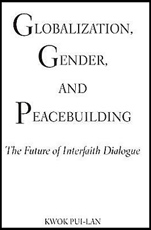Kwok Pui-lan is the William F. Cole Professor of Christian Theology and Spirituality at the Episcopal Divinity School in Cambridge, Massachusetts. She was President of the American Academy of Religion in 2011 and has published extensively in the areas of Asian feminist theology, biblical interpretation, and postcolonial criticism. This paperback consists of her speech for the 2011 Madeleva Lecture in Spirituality.
Pui-lan begins with an examination of the impact of globalization upon interreligious relationships and dialogue. She compels us to ask ourselves what we can make out of the fact that Los Angeles has become the most religiously diverse city in the world with 131 Buddhist temples and meditation centers, 58 mosques, 18 Hindu temples, and 16 Shinto worship centers. But conservative Christians continue to reject pluralism as a nefarious scheme to get people to give up the uniqueness of the one true faith. In addition, the word interreligious dialogue has been replaced by interfaith dialogue.
Although some are rejoicing in the benefits of interfaith dialogue, many women feel left out of the process which is dominated by men in various parts of the world. Ursula King laments that feminists are not being heard. The continuing debasement and persecution of women in countries where Muslim fundamentalists are in control is a scourge on a faith. The Prophet Muhammad was very open to women and their views.
There is much work to be done as Nobel Peace Laureate Desmond Tutu said in 2001:
"Religion has fueled alienation and conflict and has exacerbated intolerance and injustice and oppression. Some of the ghastliest atrocities have happened and are happening in the name of religion. It need not be so if we can learn the obvious: that no religion can hope to have a monopoly on God, on goodness and virtue and truth."
In the last section of her erudite lecture, Pui-lan discusses polydoxy which "debunks the myth of the superiority of one God, one creed, and one church, and holds multiple traditions and perspectives together when looking at God and reality." Perhaps the best approach to the intractable problems of war is for the world's religions to admit their differences while still working together as a force for peacebuilding.
